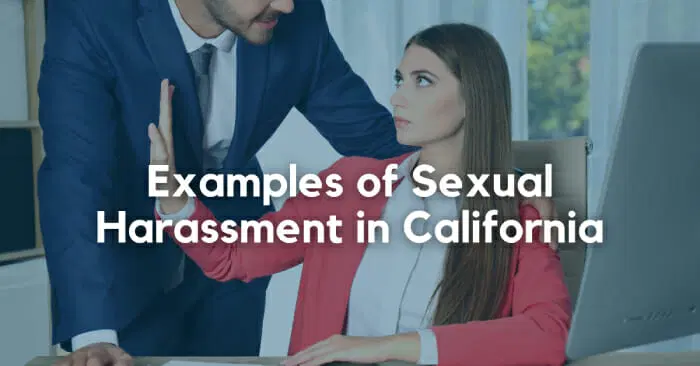
25 Sexual Harassment Examples Under California Law
Legally reviewed by: Jessica Anvar Stotz, JD, MBA
California sexual harassment law is defined as unwanted sexual advances, or other verbal, physical or visual conduct of a sexual nature that is severe or pervasive enough to create an intimidating, hostile or offensive work environment, or that interferes with an individual’s work performance.
The California Fair Employment and Housing Act (FEHA) prohibits sexual harassment in the workplace and applies to all employers with one or more employees. FEHA defines sexual harassment as:
- Sexual advances, comments, or gestures
- Requests for sexual favors
- Any other verbal, physical, or visual conduct of a sexual nature
To be considered sexual harassment under California law, the conduct must be unwelcome and either:
- So severe or pervasive that it creates an intimidating, hostile, or offensive work environment
- So severe that it prevents the victim from performing their job duties
In addition, the FEHA also prohibits retaliation against an employee who reports or opposes sexual harassment or discrimination.
Examples of Sexual Harassment in California
- Making unwanted sexual advances towards someone
- Unwanted touching or groping
- Sexually suggestive comments or jokes
- Displaying sexually explicit material in the workplace
- Pressuring someone to perform sexual acts
- Asking about someone’s sexual preferences or history
- Making sexual gestures or facial expressions
- Sending sexually explicit messages or images
- Making unwanted sexual comments about someone’s appearance
- Offering employment benefits in exchange for sexual favors
- Stalking or otherwise harassing someone with sexual intent
- Engaging in physical contact or making physical advances
- Making sexual comments about someone’s body
- Engaging in sexual misconduct while in a position of authority
- Making sexual comments about someone’s clothing
- Creating a hostile work environment based on sexual harassment
- Using derogatory sexual terms or slurs
- Making unwelcome sexual invitations or requests
- Commenting on someone’s sexual behavior or preferences
- Engaging in lewd or lascivious behavior towards someone
- Using sexually suggestive language or innuendos
- Making unwelcome sexual advances via email or social media
- Sexually harassing someone during a job interview or performance review
- Requiring someone to dress in a sexually provocative manner
- Making unwanted sexual advances towards someone in a public place.
It’s important to note that this list is not exhaustive, and any unwanted sexual behavior that creates a hostile or offensive work environment may be considered sexual harassment under California law.
What You Can Do if You’re Being Sexually Harassed in California?
If you are a victim of sexual harassment in California, there are several steps you can take to protect your rights and seek redress. Here are some actions you can consider:
- Report the harassment: You have the right to report any instances of sexual harassment to your employer’s HR department, a supervisor, or a higher-up manager. You can also file a complaint with the California Department of Fair Employment and Housing (DFEH) or the Equal Employment Opportunity Commission (EEOC).
- Keep a record: Document any incidents of sexual harassment, including the time, date, location, and details of what happened. Keep any relevant emails, texts, or other communication, and write down the names of any witnesses.
- Seek support: Talk to a trusted friend, family member, or mental health professional about your experience. It’s essential to take care of your physical and emotional well-being.
- Consult with an attorney: Consider consulting with an experienced sexual harassment attorney who can help you understand your rights and legal options.
- Follow up with your employer: After reporting the harassment, follow up with your employer to ensure they are investigating and addressing the issue. If they do not take appropriate action, you may need to escalate your complaint.
- File a complaint: If your employer fails to address the issue, you may file a complaint with the DFEH or EEOC. These agencies can investigate the matter and may even file a lawsuit on your behalf.
Remember, you have the right to a safe and harassment-free workplace. If you have been a victim of sexual harassment, it’s important to take action to protect yourself and hold those responsible accountable for their actions.

What You Should Not Do if You’re Being Sexually Harassed in California
If you are being sexually harassed in California, there are certain things that you should avoid doing, as they can potentially harm your case or make matters worse. Here are some things you should NOT do if you’re being sexually harassed:
- Do not ignore the behavior: It can be tempting to brush off instances of sexual harassment and try to move on, but ignoring the behavior may allow it to continue and may make it more difficult to address later.
- Do not confront the harasser alone: Confronting the harasser alone may put you in a potentially dangerous situation, and it may not be effective in stopping the harassment. Instead, report the behavior to your employer, HR department, or a higher-up manager.
- Make sure not to retaliate: It’s important not to retaliate against the harasser or engage in any behavior that could be perceived as harassment yourself. This could harm your case and make it more difficult to address the issue.
- Do not quit your job immediately: While it may be tempting to quit your job to escape the harassment, it’s important to exhaust all avenues of reporting and addressing the issue before resigning. Quitting immediately may also harm your ability to pursue legal action.
- Do not delay in reporting the harassment: It’s important to report instances of sexual harassment as soon as possible. Delaying may make it more difficult to gather evidence or remember specific details, and it could also harm your case.
- Don’t feel ashamed or embarrassed: Remember, sexual harassment is never your fault, and you should not feel ashamed or embarrassed about reporting it. You have the right to a safe and harassment-free workplace, and reporting the behavior is a courageous and important step towards achieving that.
Difference Between Sexual Harassment and Sexual Assault in California
In California, sexual assault and sexual harassment are two distinct legal concepts with different definitions and legal consequences.
Sexual assault is a crime of a sexual nature that involves unwanted sexual contact or touching, including rape, attempted rape, and sexual battery. In California, sexual assault is a criminal offense punishable by law, and the offender may face fines, imprisonment, and other penalties.
On the other hand, sexual harassment is a form of workplace discrimination that involves unwelcome sexual advances or conduct that is severe or pervasive enough to create a hostile work environment or interfere with an employee’s ability to do their job. Sexual harassment can take many forms, including verbal, visual, and physical conduct.
Under California law, sexual harassment is illegal and can result in civil liability for the employer, as well as disciplinary action against the offender. Victims of sexual harassment can seek damages for lost wages, emotional distress, and other harm caused by the harassment.
The key difference between sexual assault and sexual harassment is that sexual assault is a crime and involves physical contact, while sexual harassment is a civil wrong that can take many different forms, including verbal or visual conduct, and does not always involve physical contact.
It’s important to note that sexual assault and sexual harassment are both serious issues that can have profound and lasting effects on victims. If you have experienced sexual harassment or sexual assault in California, it’s important to seek help and support from trained professionals and legal resources.
Monetary Damages Sexual Harassment Victims Can Recover
In California, victims of sexual harassment may be entitled to recover various monetary damages, including:
- Lost wages and benefits: Victims of sexual harassment may be entitled to recover lost wages and benefits if they had to take time off work or were forced to quit their job as a result of the harassment.
- Emotional distress damages: Victims of sexual harassment may also be entitled to recover damages for emotional distress, which can include depression, anxiety, and other psychological harm caused by the harassment.
- Punitive damages: In some cases, victims of sexual harassment may be entitled to punitive damages, which are designed to punish the harasser and deter similar conduct in the future. Punitive damages can be significant, and in California, they are generally capped at a multiple of the compensatory damages awarded.
- Attorney’s fees and costs: If a victim of sexual harassment prevails in their case, they may be entitled to recover attorney’s fees and costs associated with bringing the lawsuit.
It’s important to note that the damages recoverable in a sexual harassment case can vary widely depending on the specific facts and circumstances of the case. It’s essential to consult with an experienced employment law attorney who can evaluate your case and help you understand the damages you may be entitled to recover.
How Can a Sexual Harassment Attorney Help?
A sexual harassment attorney can help you in several ways if you have been the victim of sexual harassment in California. Here are some of the ways an attorney can assist you:
- Provide legal advice: A sexual harassment attorney can help you understand your legal rights and options under California law. They can explain the legal process and advise you on the best course of action based on the specific circumstances of your case.
- Conduct an investigation: An attorney can conduct an independent investigation into the allegations of sexual harassment to gather evidence to support your case. This may include interviewing witnesses, reviewing documents, and gathering other evidence.
- Negotiate a settlement: An attorney can negotiate with the other party to resolve the case outside of court, through a settlement agreement. Settlement agreements can be a faster and less expensive way to resolve a case, and an attorney can help ensure that any settlement is fair and equitable.
- File a lawsuit: If a settlement cannot be reached, an attorney can file a lawsuit on your behalf and represent you in court. A sexual harassment attorney can help ensure that your case is presented effectively and that your legal rights are protected throughout the legal process.
- Provide emotional support: Dealing with sexual harassment can be emotionally challenging, and an attorney can provide guidance and support throughout the legal process. They can help you understand what to expect and provide you with the resources and support you need to move forward.
Overall, a sexual harassment attorney can be an invaluable resource if you have been the victim of sexual harassment in California. They can help you understand your legal rights and options, and they can provide the legal representation and emotional support you need to seek justice and hold the responsible parties accountable.

Get Connected with a Sexual Harassment Attorney Near You
If you have questions about your current situation, LawLinq is here to help. We connect victims of sexual harassment with top rated attorneys in your area for free. We have the local knowledge and are able to connect you with an attorney for free.
We know this is an extremely troubling time. Give us a call when you’re ready.


